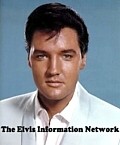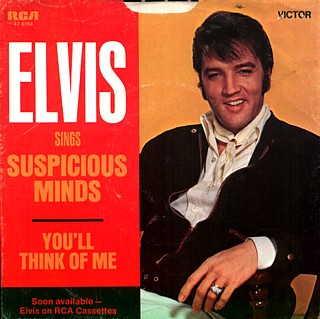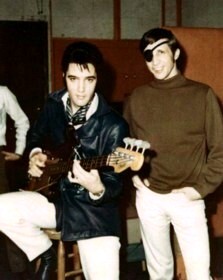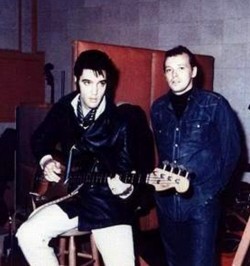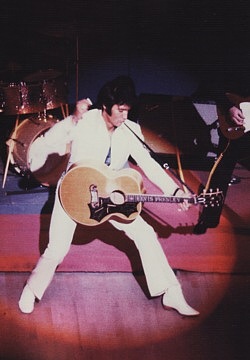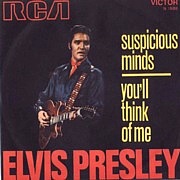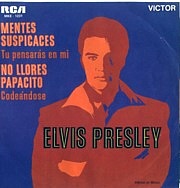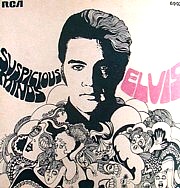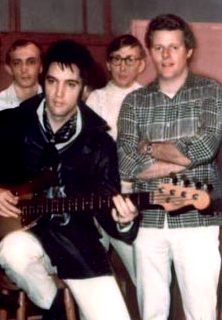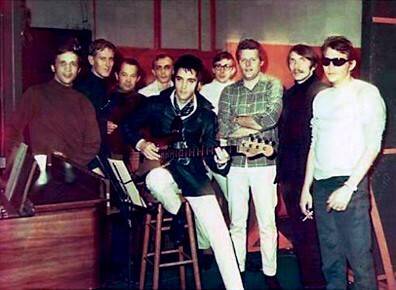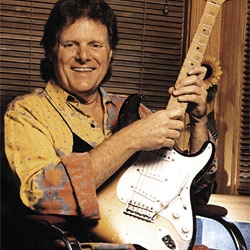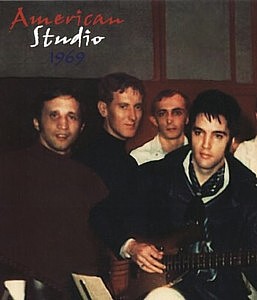 |
 |

'Suspicious Minds' / 'You'll Think Of Me' RCA Single 47-9764
Released August 26 1969.
Recorded January 23 1969 at American Studios, Memphis 'Suspicious Minds' was Elvis' greatest single of the 1960s and opinion polls often vote it as the greatest song Elvis ever recorded. It was the final evening of his first recording session of 1969 and Elvis was enthused when he had the chance to meet one of his musical heroes Roy Hamilton who was working at the same studio. With renewed excitement Elvis threw himself into the final evening’s work showing an incredible intensity firstly on ‘Without Love’ and then the impromptu ‘I’ll Hold You In My Heart’. It wouldn’t be until the final early-morning hours of January 23rd and the last song of the 10 day session that Elvis would complete ‘Suspicious Minds’. The final over-dubbed single would be released on August 26th 1969, only two days before the end of Elvis’ record-breaking Las Vegas season. The Composition 'Suspicious Minds' was composed by resident songwriter Mark James who had recorded and released a version of his own on Scepter Records the previous year. His original version was also recorded in American Studios with the same house-band and produced by Chips Moman. While James would also go on to write the other Elvis hits 'Always On My Mind', 'Raised On Rock', ‘It’s Only Love’ and 'Moody Blue' there was a special magic about ‘Suspicious Minds’. Mark James explains, "I lived and breathed working at American Studios. I wrote songs night and day. I was really driven to get songs on the radio. When I went home at night, most of the time I'd only sleep a few hours because I had another session in the morning or because I was writing most of the night hoping to go back in the studio, the next day with a good song to record. I had the idea for ‘Suspicious Minds’ and it started coming to me one night. First the title came and I thought about it and lived with it a while. Then the lyric came to me, "caught in a trap, I can't walk out because I love YOU too much, baby." What I was trying to say is that we can't live together or attain our dreams or build on anything if we don't trust one another. ‘Suspicious Minds’ captured a lot of soul. I was a writer trying to write a great song, a hit song and it came off just right". The 1969 pop charts were one of the strongest in years with the political, 'Bad Moon Rising' by Creedence Clearwater Revival, 'Something in the Air' by Thunderclap Newman mixing with the innovative, David Bowie's 'Space Oddity' and the classics, The Rolling Stones 'Honky Tonk Women' and The Beatles 'Come Together'. ‘Suspicious Minds’ was a serious pop song about deep love, suspicion and hurt and with a dramatic operatic power. Elvis’ musical strength had always been as a great interpretive singer and it would only be the absolute passion he injected into the song that would elevate it to the #1 slot amongst these other classics. The Recording. After recording the politically contemporary and inspirational 'If I Can Dream’ Elvis had vowed to 68 TV Special producer Steve Binder that he would never sing another song he didn't believe in. ‘In the Ghetto’ the first single taken from the American Studio Memphis sessions had confirmed Elvis’ musical reawakening but had only reached # 3 on the all-important US Billboard charts. Memphis Horns trumpet player Wayne Jackson explains, "American Studios was in the worst part of town. Stax was a little nearer Graceland, but American and also Hi Studios were in the worst parts of town. After the recent assassination of Martin Luther King it was tense, especially in the parts of Memphis that were mainly black. I remember that the studio was guarded by dogs, and there was a man on the roof with a gun minding the parking lot." 'Suspicious Minds' starts with *Reggie Young’s nagging, repeating guitar-riff matched to Bobby Wood’s piano line which helps sets the listener on edge. However when Elvis comes in with the extraordinary first line for a pop love-song "We're caught in a trap" the drama is immediately revealed. Throughout the whole song there is a real flow of emotion with Elvis' vocal sounding both vulnerable and desperate as he pleads to his girlfriend that he loves her too much. *Very sadly inspirational guitarist Reggie Young passed away, aged 82, during the same week everyone was thinking about the 50th anniversary of Elvis' 1969 "Memphis Sessions" and his great contribution to Elvis legacy. See Obit below
While Elvis’ regular producer Felton Jarvis was also involved, it was American’s producer Chips Moman who controlled the session and it is his voice you can hear on the session recordings as he drives Elvis and the band for better and better takes. Marty Lacker explains, "During the sessions I spent most of my time in the control room with Chips. Elvis came in and said to Chips that he didn't know what to do because he didn't have any good songs left to record, describing the crap that Parker and Freddy Bienstock had sent him. That was the point when Chips suggested ‘Suspicious Minds’ and that he thought it would be great for Elvis. He was also up front in telling Elvis that he had cut it already on Mark James but that it didn't do anything on the charts."
The impact that Chips Moman had cannot be understated. This creative and musically innovative setting obviously invigorated Elvis and throughout the eight takes you can hear him striving for that consummate perfection as he pours his soul into every word. By Take 6 Elvis is still faltering over the timing yet asks for Chips to "Save the last take for me." Elvis recognised the greatness of the song and worked at it for 3 hours until it was time for everyone to head home into the dawn. Interestingly for collectors the 1987 RCA release ‘The Memphis Record’ features the final 'Suspicious Minds' Master with the backing-vocal & strings overdubs but without the added brass section nor with the extended fade-out. Unusually for an Elvis release, Chips Moman also recorded a dual-track for Elvis’ lead vocal thus increasing the emotional power of the lyric. A portion of Elvis singing along, while listening to his other vocal on headphones, can be heard on the ‘Elv1s 30 #1s’ DVD audio release. All 8 takes and rehearsals can be heard on various bootlegs.
Felton Jarvis’ Overdub On August 7th Felton Jarvis, along with engineer Bill Porter, took the master tape into United Recording Studio, Las Vegas to create the unique fade and return ending. In the late sixties mono A.M. radio was still the main source of pop music and so two separate mono and stereo masters were recorded. The idea of a mono master was to create a greater impact so that it would jump out with more power from car radios. Both version featured different brass overdubs and it is interesting to note that the recently released ‘From Elvis In Memphis’ Legacy edition includes the all-important mono master of ‘Suspicious Minds’. It was at this Las Vegas session that Felton Jarvis also did the final stereo and mono mixes. The final single runs 4:29 minutes with the fade-out from 3:19 - 3:34 & fade-in 3:34 - 3:47. While the false ending not only replicated Elvis’ sensational on stage version, the fade & repeat also cleverly created the feeling that the singer is indeed "Caught in a trap" within the actual song. This idea was yet another unique stamp that would be forever memorable to anyone that heard the song. If a radio station fades the song out early it just sounds wrong. At the time however not only was the false-ending not the record that Chips Moman had produced but was also a guaranteed trap for radio jocks to fall in to. This had a potential to reduce the all-important radio plays. At a full four and a half minutes, the final version of 'Suspicious Minds' was also nearly twice as long many of Elvis previous top ten hits. I still feel that the fade & bump ending is good for on stage but not on a record and that it was a stupid, amateurish move by Felton".
The Publishing. Incredibly 'Suspicious Minds' nearly wasn't released at all. This was because of Col Parker’s and Hill & Range’s desire to always get a cut of the publishing. Chips Moman owned the rights to 'Suspicious Minds' and he certainly wasn’t going to part with any of it. In the end it was a triumph of both Chips Moman and Elvis that they both stood their ground. At one point Moman even suggested that Parker’s representatives could take their money and "get the hell out". Parker's assistant Tom Diskin still persisted and complained to Elvis personally. Elvis told Diskin, "I know you’re just doing your job, but leave it to Chips and me. It’s okay". In the end RCA's Harry Jenkins also had to weigh in to help calm things down but this time he was also on the side of Elvis and Chips. Chips Moman explains how it was for him, "Hill and Range wanted the publishing rights to ‘In the Ghetto’ and ‘Suspicious Minds’, I just blew up! I said, "Hey, there ain't no more session!" We had already done some sides, and I said, "You can take everything we've done so far, be my guest, and just get out of my studio, 'cause there ain't no more sessions!" There were just too many people, and it was aggravating on all sides. But I think they were kind of shocked when I stood up to them. They probably had never had anyone ask them to leave the studio before, but I did. And it turned out better for Elvis." Bobby Wood, "The whole thing started out on a bad note and this disagreement over publishing rights. Unbelievably it looked as if the whole thing was going to be called off. But Elvis weighed in and asked Chips personally how they could work without all these problems. Chips told him, "Get those publishing cronies and execs out of the studio, I don't want to see 'em no more" and Elvis said, "You got it!"
Released in the US on August 26th ‘Suspicious Minds’ would climb to Number 1 on November 1st 1969. Later on the song would be covered by countless other artists who would also take it into the charts, from The Fine Young Cannibals to Dwight Yoakam. But it is Elvis’ version that still regularly features in popular culture today, from 2001's movie 'Black Hawk Down' to the opening credits of the Coen Brother's film 'Intolerable Cruelty'.
Suspicious Minds - Single sleeves from Italy, Mexico & Turkey
After the contemporary magnificence of 'In The Ghetto' the release of 'Suspicious Minds' really was the ultimate invincible chart statement. A Billboard number 1 that defined Elvis’ musical renaissance. Mark James, "Afterwards Elvis called and invited me to see him perform in Vegas. It was a great time for me because ‘Suspicious Minds’ was racing up the charts. When he sang ‘Suspicious Minds’ that night he said, "We've got a great writer out in the crowd tonight" and he introduced me and then he introduced Lucille Ball right behind me. His live performance of the song was fantastic. It was more than I ever could have imagined. Elvis and his band poured so much energy into it. When I wrote ‘Suspicious Minds’ I knew it was a great song and always believed it could be a number one record. When ‘Suspicious Minds’ comes on the radio today I'll still listen to it and I have a great sense of pride hearing that record. There's nobody like Elvis. He was one of a kind."
Marty Lacker & Bobby Wood were interviewed for this article by Piers Beagley. ‘Suspicious Minds’ Official Releases.
'Suspicious Minds'
We're caught in a trap
Click here to comment on this article
|
|
